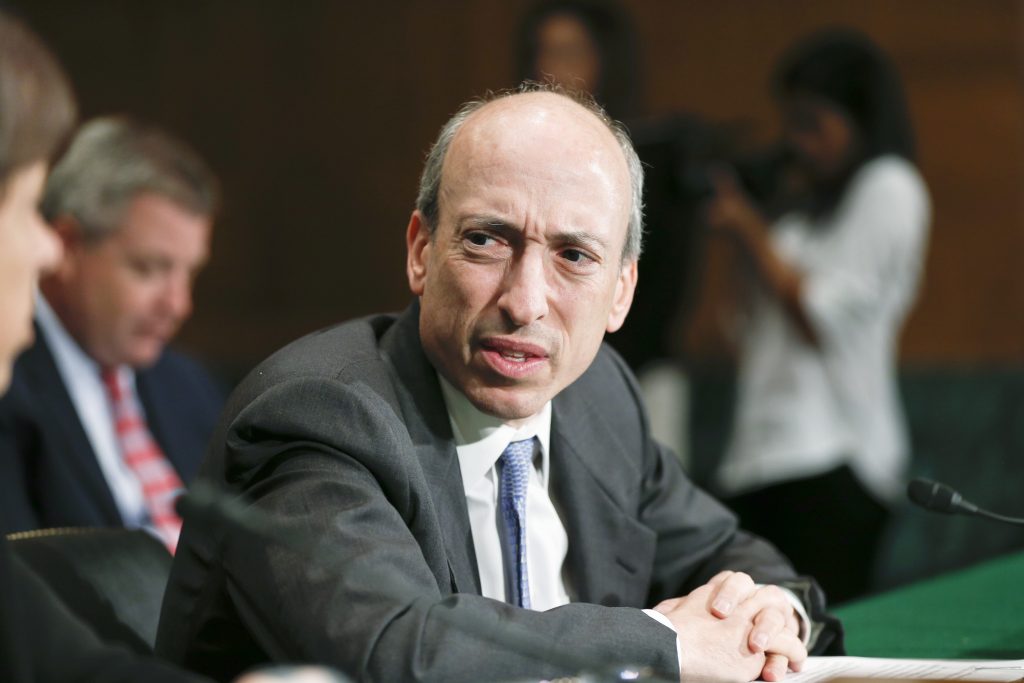When you think of a “banana republic,” you think of corrupt dictators someplace distant, where the people in power control the economy and jail their political opponents. Places like this still exist in the world — and believe it or not, right here in the good ’ol US of A.
Don’t believe me? Consider the absurd campaign-finance fraud case that partisan Democrat Manhattan DA Alvin Bragg brought against Donald Trump. Bragg twisted logic and law to indict the former president because he was a Republican, even if the stated premise was that Trump paid hush money to an alleged paramour.
That Trump, as he campaigns for the White House, could go to jail because of a $130,000 payment to Stormy Daniels, is real banana republic stuff. Even more banana republic is Bragg’s broader policy to indict political opponents while he lets violent criminals roam free as one of the most “progressive” prosecutors in the country.
Securities and Exchange Commission Chairman Gary Gensler deserves a place in our country’s Banana Republic Hall of Fame as well. Gensler has, of course, been flirting with banana republic status for some time. He is regulating crypto through enforcement. He also is looking to change decades of securities laws by forcing major companies to expand their disclosures beyond financial information to include how they’re addressing climate change and other progressive policy goals.
The SEC chief is supposed to be Wall Street’s top cop but, like Bragg, Gensler has chosen to ignore real malfeasance such as the obvious pumping and dumping we’ve seen in some “meme stocks,” costing generational wealth for small investors who believed the pumpers.
Yet what puts Gensler firmly in the banana republic camp is his latest prosecution of something that’s pretty prosaic: The functional equivalent of a books and records violation committed by a trading firm named Virtu, according to securities lawyers I spoke to. Last week, Gensler’s SEC tried to make Virtu’s faux pas into the crime of the century.
Why? Well, maybe it begins with the fact that Virtu is run by a guy named Doug Cifu, who has been critical of Gensler’s bizarre reign as SEC chief.
Yes, real banana republic stuff in this one.
Cifu is a rare CEO in that he runs a profitable business and he speaks his mind. Virtu is a market maker — a trading firm that matches buyers and sellers of stock. It also employs people to trade stocks using the company’s capital. It is one of the top firms involved in computerized high-speed trading, which is controversial to some but not to people who know how markets work.
Most small investors don’t know Virtu is the reason you can trade on your Robinhood app for free, and at low cost via brokerages like Charles Schwab, E*TRADE, etc. It utilizes computer programming to make markets more efficient for small investors and still makes a ton of money.
Cifu, a lawyer by training, understands the markets and their structure better than almost anyone I know on Wall Street — and he’s not bashful about telling you as much. Again, that puts him at odds with some folks even if it’s so refreshing since most Wall Street C-suite types are fearful of offending anyone, especially their regulators at the SEC. That’s why they often sound like simpletons, automatons, or both.
Not Cifu. One of the people Cifu has spoken out against, forcefully and at times eloquently, is Gensler, his primary regulator, no less. Gensler has grand plans to remake the stock market to score brownie points with lefties like the powerful Wall Street-hating senator from Massachusetts, Elizabeth Warren.
Investor roadkill
But Cifu says Gensler is looking to fix something that isn’t broken since stock trading runs pretty seamlessly, and is inexpensive. When Gensler gets through with “fixing” the markets, investors might end up as roadkill. And from what I understand, Cifu has said that to Gensler’s face.
Ouch.
That’s one reason why the Gensler-SEC enforcement action against Virtu last week appears so banana republic-like. Another is that the charges are incredibly weak. The SEC is taking issue with Virtu’s activities during a 15-month period in 2018 and 2019 when it was digesting an acquisition and there was a flaw in its control system. The SEC said Virtu’s traders could spy on what the company was doing on the market-making side and profitably trade off that information, and then essentially lied about it to customers. Those are serious violations of securities laws, the agency says.
OK, insider trading is a crime. But it’s nowhere to be found in the complaint. That’s because, Virtu says, it didn’t happen. Even the SEC concedes that by failing to show a single instance of traders spying on what was happening in market-making. Virtu tells me the SEC is also ignoring that there were other controls in place to prevent it. The glitch, the company said, was caught by Virtu and self-reported to the SEC. Its misstatements — failure to disclose the alleged glitch — weren’t lies but the company’s contention that customer data were secured.
Most cases like this get settled; Virtu probably would have, were it not for Gensler’s desire to have the company agree to serious charges for a victimless crime.
So now the case will likely go to court, where a judge will decide whether to allow markets to morph into banana republic status.


